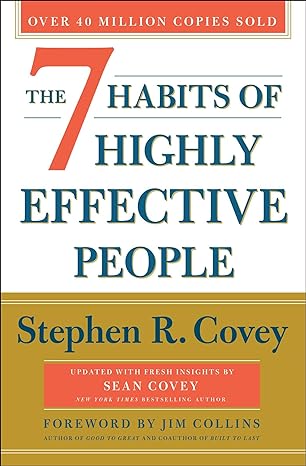Stephen R. Covey’s “The 7 Habits of Highly Effective People” is a landmark book in the self-help genre, focusing on personal and professional effectiveness through the development of character and ethical values. Covey presents a principle-centered approach for solving personal and professional problems. This summary provides a concise overview of the seven habits, each with actionable steps, aimed to enhance both personal and professional effectiveness.
Habit 1: Be Proactive
Being proactive is about taking responsibility for your life. Proactive people recognize that they are “response-able” – they have the ability to choose their responses.
- Understand the Circle of Influence: Focus on concerns you can control, rather than the concerns over which you have no real control.
- Practice Self-Awareness: Recognize your moods, thoughts, and behaviors, and understand how they impact your choices and actions.
- Take Initiative: Don’t wait for things to happen; take steps to influence outcomes and make things happen.
Habit 2: Begin with the End in Mind
This habit involves understanding what you want to achieve in life – envisioning your life goals and what success looks like for you.
- Define Your Personal Mission Statement: Identify your values and goals, and create a mission statement that reflects what is truly important to you.
- Visualize Your Goals: Regularly visualize your goals and what achieving them looks like, to maintain focus and direction.
- Set Measurable Goals: Break down your goals into specific, measurable steps and work towards them diligently.
Habit 3: Put First Things First
Prioritizing and managing your time effectively is crucial. This habit is about organizing and executing around your most important priorities.
- Prioritize Tasks: Use a time management matrix to prioritize tasks based on urgency and importance.
- Learn to Say No: Politely but firmly say no to tasks that do not align with your highest priorities.
- Plan Weekly: Spend time each week to plan your activities based on your personal and professional priorities.
Habit 4: Think Win-Win
This habit is about seeking mutually beneficial solutions or agreements in your relationships, believing in a “win-win” scenario for all involved.
- Seek Mutual Benefit: In interactions with others, look for solutions that are beneficial for all parties involved.
- Develop an Abundance Mentality: Believe that there is enough success to go around and that others’ successes do not diminish your own.
- Practice Empathetic Listening: Listen empathetically to understand others’ viewpoints, which can lead to win-win solutions.
Habit 5: Seek First to Understand, Then to Be Understood
Effective communication is key in building positive relationships. This habit emphasizes the importance of empathetic listening.
- Practice Active Listening: Listen with the intent to understand, not just to reply.
- Reflect Feelings: Show that you understand how the other person feels by reflecting their emotions in your responses.
- Build Trust: Demonstrating understanding builds trust and opens up lines of communication.
Habit 6: Synergize
Synergy is about valuing differences and bringing together diverse viewpoints to create a whole that is greater than the sum of its parts.
- Value Differences: Embrace and leverage the different perspectives and strengths of others.
- Foster Teamwork: Encourage open-mindedness and collaboration in team settings.
- Explore New Solutions: Use creative collaboration to find new and better solutions than what individuals could achieve alone.
Habit 7: Sharpen the Saw
This habit focuses on continuous improvement and self-renewal in four areas: physical, social/emotional, mental, and spiritual.
- Take Care of Your Body: Engage in physical activities, eat healthily, and get enough rest.
- Nourish Your Relationships: Invest time and energy in developing meaningful relationships.
- Stimulate Your Mind: Engage in continuous learning and mental development activities.
- Renew Your Spirit: Spend time in nature, meditate, or engage in spiritual or religious practices that rejuvenate your spirit.
In conclusion, “The 7 Habits of Highly Effective People” by Stephen R. Covey provides a framework for personal effectiveness that emphasizes character, ethics, and a holistic approach to personal and professional development. By integrating these habits into your life, you can achieve greater productivity, improved communication, and enhanced overall well-being.

